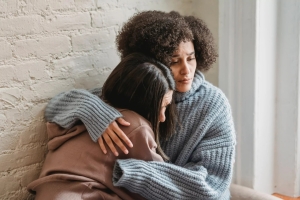The Cold Hard Truth about Overcoming an Eating Disorder
The crushing emptiness in the pit of your stomach. The lassitude of running on empty for days on end. A perpetual chill winds itself throughout your bones then forms a noose around your neck. ‘Any day now,’ you think, ‘Any day now I will be beautiful.’
But that closure never comes. The reflection in the mirror remains the same – fat stomach, fat thighs, fat arms. This is not a nightmare but reality for millions of men and women suffering from eating disorders around the world, and it was my personal horror story for several years.
I wanted to be thinner, prettier, and more ideal in every sense of the word
My eating disorder was the result of an inferiority complex hurdled into the darkest pits of hell. For me, low self-esteem went hand-in-hand with rigid perfectionism. Nothing I did was ever good enough, for me and everyone around me. That was a truly distorted view of the world. Truth was, some people did see the best of me. I was blind. I wanted to be thinner, prettier, and more ideal in every sense of the word.
I thought the severe calorie restriction was doing something for me
The start of the eating disorder developed in high school when I refused to eat for hours because I thought the severe calorie restriction was doing something for me. After ten hours of hardly nothing in my stomach, gave the lie to my mom that lunch was really good today, I’d come back home or get dropped off at a neighbor’s house until granny picked me up and glut on every sugary, fattening food in sight. I’d eat a whole pizza in one sitting then stuff down several scoops of ice cream. Typical binge eating behavior.
Read also – 8 Natural Ways to Heal Your Digestion
College did not help matters
I started restricting further, and the nutritional balance of what I did eat was lacking anything useful. I got depressed. My grades did not lack, though. Then I had the grand opportunity to study abroad in Japan. The first round was three months, where I ate and drank so much I nullified the effect of all the daily physical activity.
You are probably thinking, so what? Freshman 15, dude. But no, that wasn’t it. I was devastated by this. I realized suddenly that portion sizes in America are whack and scrambled to eat tinier meals. I kicked alcohol completely. I kicked fats, sugar… everything that might contribute to weight gain.
Then when I went back to Japan after the Great Tohoku Earthquake of 2011, my eating disorder went into full swing. I restricted down to 1500 calories a day. I was dancing, going to school, commuting by foot for over 45 minutes each day and doing a bunch of other physical activities that left me drained. Within five months, I stopped menstruating. I was beyond cold, tired and agitated.
I’d lie awake in the middle of the night listening to my stomach gurgle and staring at the words of my then Japanese ‘boyfriend’ saying, ‘If you get fat, it would be such a waste.’ My father’s insults about how ugly and soft I was would echo in my ears, and I’d think, ‘Look at me now. I am beautiful.’
Naturally, the Asians thought I was prettier now than before. You could see my cheekbones, the shape of my eyes, the length of my limbs – how American beauties are presumed to look.
And I kept getting thinner
Then I went home for Christmas. At the airport, I crossed the throngs of people, meeting my parents’ eyes. For a moment, I could see they did not recognize me. When they did, they were too afraid to hug me. Now they describe this moment as meeting a cast member of the Walking Dead.
I was nearly barred from returning to Japan. But I was supposed to enter college there. The effects of malnutrition become more pronounced in winter. I suddenly could no longer tolerate the stresses of finding employment and graduating from the language school.
Ultimately, I realized that something was wrong. I swallowed the horrifying thought of giving up my dreams of living in Japan to return Stateside. At the time, I did not know it was an eating disorder. This affliction was diagnosed as the combined effect of an autoimmune disorder, depression and anorexia nervosa.
The struggle seemed never-ending
Years passed. The struggle seemed never-ending. I went through episodes of depression and restriction. I purged through hours of exercise. Then I would stand outside in the sun, feeling the creakiness of my joints and starved body and hate myself for this self-inflicted torture.
The things I loved doing became impossible. The dance was hard because I couldn’t I think clearly. Yoga was painful because I had no energy to breathe properly. Those around me suffered, because I was no longer Valerie. I was a ghost. Life was, in short, moving on as if I’d died.
Read also – 8 Nutritional All-Stars for Women
How did I overcome?
Getting into fitness, publicly speaking out about malnutrition and eating disorder, using dance and movement to communicate, and partaking in cognitive-behavioral therapy practices taught me the means to seek strength.
Supportive friendships also bolstered me. The relationship I had with food altered as I restructured my deleterious thoughts. Coming to terms with the issues driving me to starvation was a humbling trial. Giving up hate was difficult. Gaining tolerance was even more of a gauntlet. But, somehow, I did it.
Those who have recovered from eating disorders survived more than severe weight loss. The ghost of the issue is always there. Physical and physiological scars remain, depending on how long the eating disorder persisted. Some, sadly, never see better days.
To those who have survived, you are some a great warrior, you know that? Overcoming the war inside breaks even the strongest of minds, but you fought it and owned it.
To my sisters and brothers suffering from eating disorder, don’t give up. You have a battle ahead of you, but you are not your eating disorder. There is an army behind you to lend our support.










